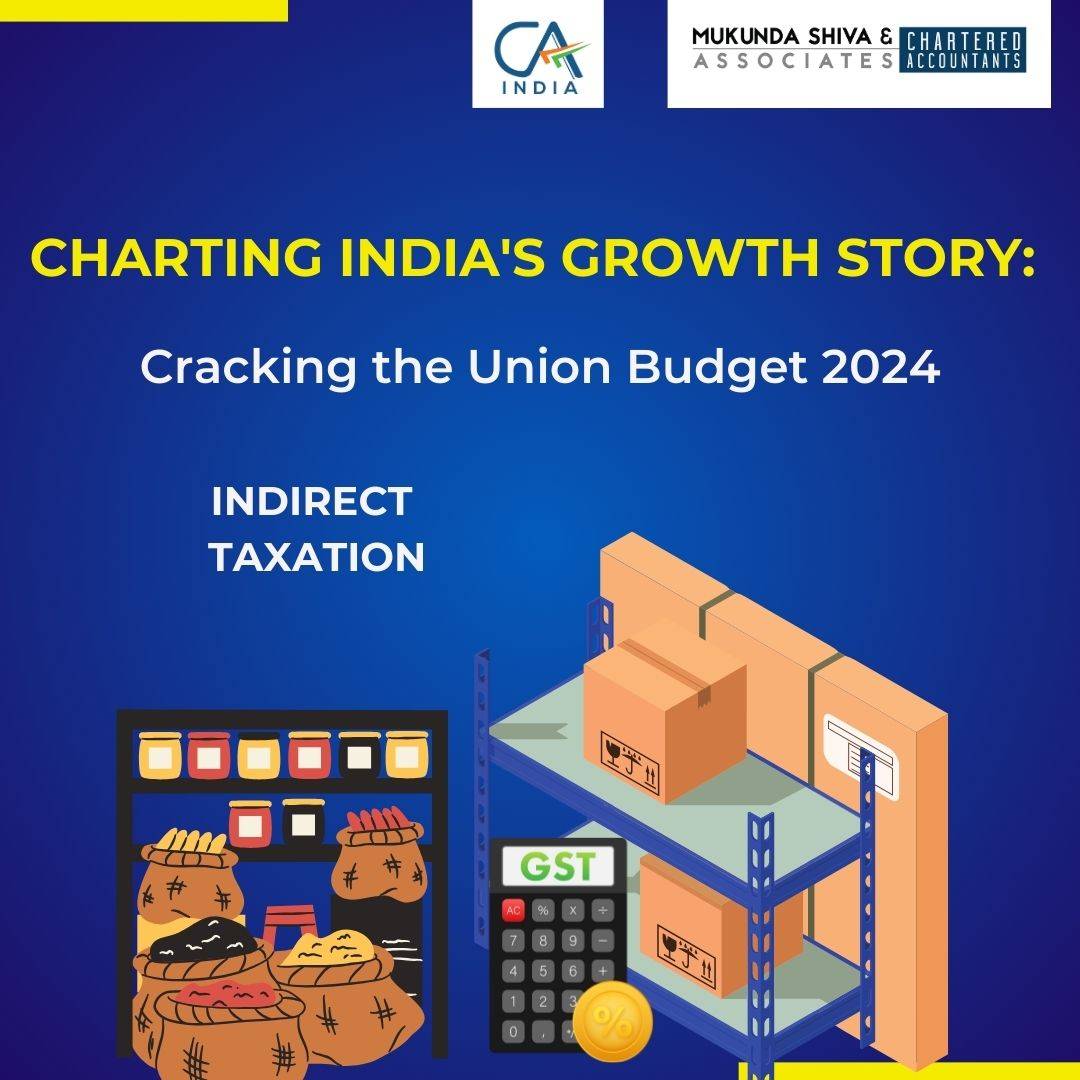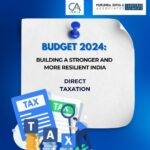Finance Bill, 2024
Summary of Amendments – INDIRECT TAXATION
Goods and Services Tax:
-
- Un-denatured extra neutral alcohol / rectified spirit used for manufacture of alcoholic liquor, for human consumption is kept out of the ambit of GST Law
- If where as a practice in the prevailing industry, GST was not paid / short paid on supplies made, the Government is now empowered to notify that tax is not payable over and above the already adopted rate in the prevalent industry.
For example – If the Government interprets that a transaction is leviable to tax at 18% while the industry has a practice of charging tax at 5% (may be due to interpretational issues), the Government is now empowered to notify that the applicable rate of tax for the said supply is only 5% and not 18%. This is to ease the impact of differential interpretation under GST.
-
- The time of supply of services for payment of RCM is amended as follows – Earliest of –
(a) Date of payment as accounted in books
(b) Date of payment as debited in the bank account
61st day from the date of invoice, in cases where invoice is required to be issued by the supplier (i.e., in case of unregistered recipients, supplier is required to raise a self invoice)
(c) 61st day from the date of invoice, in cases where invoice is required to be issued by the supplier (i.e., in case of unregistered recipients, supplier is required to raise a self invoice)
(d) Date of invoice, where invoice is to be issued by the recipient (i.e., in case of registered recipients)
Whichever is earlier - For the financial years 2017-18, 2018-19, 2019-20 and 2020-21, Input tax credit of a financial year was required to be availed within due date of September GSTR 3B of the subsequent financial year. Now, retrospective amendment is made to extend the due date to avail input tax credit for financial years 2017-18, 2018-19, 2019-20 and 2020-21 until 30.11.2021. No refund shall be paid in respect of all the admitted taxes / reversed input tax credit made till date.
- Where a registration was cancelled and then revoked, such registered person was denied from availing input tax credit after revocation of cancellation due to the restriction ofavailing ITC within due date of September GSTR 3B of the next financial year. Now the law is amended to allow registered persons to avail input tax credit (from date of cancellation till the date of order for revocation of cancellation) if all the pending returns are filed within 30 days from the date of order of revocation of cancellation of registration
- Taxes paid under section 74 of the CGST Act, 2017 (i.e., fraud or malafide intention cases) were not allowed to be availed as input tax credit. It has now been amended that all taxes paid under section 74 upto FY 2023-24 is not allowed as input tax credit. In other words, taxes paid under section 74 from FY 2024-25 onwards may be availed as input tax credit.
- TDS Returns to be filed by Government / Governmental Organizations are required to file the said return compulsorily every month.
- The Government has withdrawn the restriction of claiming refund of input tax credit if –
(a) duty drawback is claimed or(b) refund of IGST paid on the outward supplies
- Refund of unutilized input tax credit / Refund of tax paid on export of goods is not available if the exported goods are subjected to export duty
- Summons under GST can now be attended by the person summoned or a duly authorized representative of the summoned person and make true statements / produce documents;
- Section 73 of the CGST Act, 2017 (related to determination of tax under other than fraud / malafide intention cases) shall be applicable only for the financial years 2023-24
- New provisions for issuance of notice, adjudication and order from financial year 2023-24 onwards –
(a) Notice is not to be issued if the taxes not paid / short paid / erroneously refunded / ITC wrongly availed or utilized is less than Rs. 1,000 for a financial year(b) Show cause notice is required to be issued within 42 months (3.5 years) from the due date of the annual return of the said financial year(c) The penalty applicable where taxes are not paid / short paid /ITC wrongly availed / ITC wrongly utilized / erroneous refund received –
- For fraud, wilful statement and suppression of facts cases – Tax due from such person
- For other than fraud, wilful statement and suppression of facts – 10% of tax or Rs. 10,000, whichever is higher
- The time of supply of services for payment of RCM is amended as follows – Earliest of –
(d) Time limit to pass order is 12 months from the date of issuance of notice. If for any reason, the said order is not passed, the Commissioner / officer authorized by him who is not below the rank of Joint Commissioner, may extend the time limit to pass order by a maximum period of 6 months.
(e) Under other than fraud / malafide intention cases, if the person admits the liability and pays the same along with interest –
-
- Before service of notice
- Within 60 days of issue of show cause notice
Then no penalty shall be payable under the provisions of CGST Act, 2017
(f) Under fraud / malafide intention cases, if the person admits the liability and pays the same along with interest –
| Event | Penalty as a percentage of tax |
| Before service of notice | 15% of tax |
| Within 60 days of issue of show cause notice | 25% of tax |
| Within 60 days of communication of order | 50% of tax |
| After 60 days of communication of order | 100% of tax |
(g) If self-assessed tax / any amount collected as tax is not paid within 30 days from the due date of payment of such tax, then penalty of Rs. 10,000 or 10% of tax, whichever is higher is liable to be paid.
- The maximum pre-deposit payable for preferring an appeal before the Appellate Authority is now amended from 25 crores to 20 crores (i.e., 10% of tax or 20 crores, whichever is lower)
- The pre-deposit payable for preferring an appeal before the Appellate Tribunal is amended as follows –
Earlier Provision Amended Provision 20% of tax (subject to a maximum of Rs. 50
crores)10% of tax (subject to a maximum of Rs. 20 crores)
16. Summary of the Amnesty Scheme introduced in the Finance Bill, 2024 –
(a) Conditions for applicability of Amnesty Scheme –
– If notice is issued but order is not passed
– If adjudicating order is passed but appeal order is not passed
– If appeal order is passed but tribunal order is not passed
– If the demand relates to the period 01.07.2017 to 31.03.2020
– If taxes are paid in full within the time as may be prescribed in future
Then the entire interest and penalty is deemed to be waived and proceedings are concluded in this regard
(b) If interest / penalty is already paid, then no refund will be available
(c) If interest / penalty is already paid, then further appeal relying on this provision will not be available;
(d) If appeal filed is not withdrawn to avail the above benefit of the amnesty scheme within the time as prescribed, then the amnesty scheme benefit will not be available;
(e) Rest of the operational amendments are yet to be effected in the Finance Bill, 2024. We can expect the same vide notifications / rules in the coming days.
17. Activity of apportionment of co-insurance premium by the lead insurer to the co-insurer is treated as neither supply of goods nor supply of services (under Schedule III) if the lead insurer has paid GST on the entire premium collected from the insured.
18. Activity of deduction of ceding / reinsurance commission from reinsurance premium paid by insurer to the reinsurer is treated as neither supply of goods nor supply of services (under Schedule III) if the reinsurer has paid GST on the entire premium (inclusive of the said commission).


